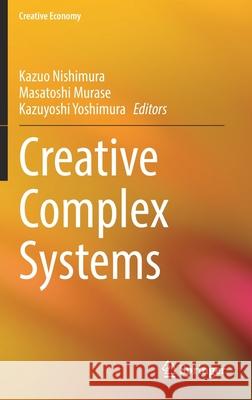Creative Complex Systems » książka



Creative Complex Systems
ISBN-13: 9789811644566 / Angielski / Twarda / 2021 / 498 str.
Creative Complex Systems
ISBN-13: 9789811644566 / Angielski / Twarda / 2021 / 498 str.
(netto: 421,70 VAT: 5%)
Najniższa cena z 30 dni: 424,07
ok. 16-18 dni roboczych.
Darmowa dostawa!
Part 1: Toward the Study of Creative Complex Systems: From the Foundation of IRU-ICSS
Kazuo Nishimura, Ph.D., is a specially appointed professor of the Research Institute for Economics and Business Administration at Kobe University in Japan. He is also a professor emeritus of Kyoto University and a member of the Japan Academy. Professor Nishimura served as president of the Japanese Economic Association in 2000 and 2001 and has been a fellow of the Econometric Society since 1992.
He is widely known for pioneering contributions in complexity economics, and served as a director of the International Research Unit of Integrated Complex System Science, Kyoto University, 2010–2013, and an external professor of the Santa Fe Institute, 2008–2017. Since 2004, he has been a member of the Board of Governors of the Institute for Complex Adaptive Matter. His research interests include general equilibrium theory, international trade theory, and nonlinear economic dynamics.
Professor Nishimura was awarded the Publication Prize of the Mathematical Society of Japan in 2005, an honorary doctorate of the University of Aix-MarseillesⅡ in 2007, the Nikkei Prize for Economics Books in 2008, the Kyoto Newspaper Grand Award in Academics in 2010, the Medal with Purple Ribbon in 2010, and the Order of the Sacred Treasure, Gold and Silver Star, in 2019.Masatoshi Murase received his Ph.D. degree from The University of Tokyo in 1987. Since 1992, he has been an associate professor at the Yukawa Institute for Theoretical Physics, Kyoto University. In 1987 and 1988 he was a visiting scientist at the Duke University Medical Center, USA, and in 1990 and 1991 was an associate professor in the Department of Mathematics of the University of California at Davis, USA. From 1985 to 1992 he was a member of the Tokyo Metropolitan Institute of Gerontology. Since 2010, he has been a member of the Cooperation Promotion Committee of the International Research Unit of Integrated Complex System Science, Kyoto University. Between 2015 and 2020 he was a director of the Research Promotion Strategy Office of the International Research Unit of Advanced Future Studies, Kyoto University.
Professor Murase is the author of Dynamics of Cellular Motility (Wiley, 1992) and is also the author of Life as History: Construction of Self–Nonself Circulation Theory (Kyoto University Press, 2000). He is the co-editor of Perspectives on Advanced Future Studies (Nakanishiya, 2020) and is the co-author of Philosophy of Co-creation (Gensosha, 2020).
Kazuyoshi Yoshimura has been a professor of the Graduate School of Science, Kyoto University, since 2002. He has also been the director of the Research Center for Low Temperature and Material Sciences, Kyoto University, since 2013; director of the International Research Unit of Integrated Complex System Science, Kyoto University, since 2015; a research member of the International Research Unit of Advanced Future Studies, Kyoto University, since 2015; and vice director of the Agency for Health, Safety, and Environment, Kyoto University, since 2016.
Professor Yoshimura received his Ph.D. in engineering from Kyoto University in 1987. Since then, he has held teaching positions in the Department of Applied Physics, Faculty of Engineering, Fukui University, from 1986 to 1988, and in the Department of Chemistry, Faculty of Science, Kyoto University, from 1988 to the present.
He has studied magnetism and superconductivity in transition-metal compounds and alloys in Kyoto University since 1981 as well as in the Massachusetts Institute of Technology, the Technical University of Vienna; the University of Illinois at Urbana–Champaign, Institute of Solid State Physics; and The University of Tokyo.In recent years, problems such as environmental and economic crises and pandemics caused by new viruses have been occurring on a global scale. Globalization brings about benefits, but it can increase the potential risks of “systemic problems”, leading to system-wide disruptions. The coronavirus pandemic, declared on March 11, 2020, by the World Health Organization, has revealed social disparities in the form of a higher risk of death for people of low-socioeconomic status and has caused massive destruction of the economy and of globalization itself. Extensive efforts to cope with these challenges have often led to the emergence of additional problems due to the chain of hidden causation. What can be done to protect against such emerging challenges?
Despite the resulting complexity, once these individual problems are considered as different aspects of a single whole, seemingly contradictory issues can become totally understandable, as they can be integrated into a single coherent framework. This is the integrationist approach in contrast to the reductionist approach. Situations of this kind are truly relevant to understanding the question, “What are creative complex systems?” This book features contributions by members and colleagues of the Kyoto University International Research Unit of Integrated Complex System Science. It broadens our outlook from the traditional view of stability, in which global situations are eventually stabilized after the impact of destruction, to “creative” complex systems.
1997-2026 DolnySlask.com Agencja Internetowa
KrainaKsiazek.PL - Księgarnia Internetowa









